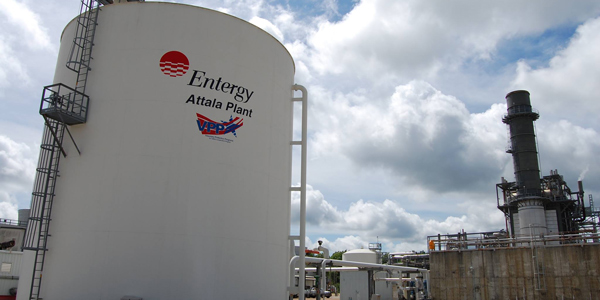By Amanda Durish Cook
After fighting a decade-long battle against a billion-dollar lawsuit over retail rates, Entergy Mississippi is supporting a bill that would restrict the ability of the state’s attorney general to sue utilities.
Attorney General Jim Hood is urging Mississippi residents to call legislators to vote against the bill, saying its defeat would ensure families remain protected against “greedy corporations.”
State legislators are considering a total three bills to limit instances in which the attorney general’s office can sue corporations on behalf of the state.
A bill introduced in the Senate would reauthorize funding for the Mississippi Public Service Commission, which faces a June 30 shutdown without reauthorization. However, Hood says new provisions in the bill attempt to impede his 2008 antitrust lawsuit over Entergy Mississippi’s rates by requiring him to first seek permission from the PSC before proceeding with legal action.
SB 2295 would give the PSC “exclusive original jurisdiction over the intrastate business and property of public utilities,” including “the establishment of retail rates; challenges, including customer complaints, to the amount of a retail rate or customer bill or whether such rate is just and reasonable; and challenges to the validity or accuracy of rates charged by a public utility, or to the accuracy or reliability of information submitted to the Public Service Commission by a public utility or other person in support of or in opposition to a proposed or approved rate, regardless of the legal theory upon which any such challenge is made.”
The Mississippi House of Representatives is considering two other bills that would also weaken the attorney general’s authority. HB 1238 would allow regulated entities to claim they do not have to abide by the Mississippi Consumer Protection Act because of other state and federal regulations, while HB 1177 seeks to bar the attorney general from filing suit and collect damages owed to the state, instead vesting that authority with state agencies and private citizens.
“These bills directly impact every Mississippian, and if they are signed into law, it would be devastating to everyone,” Hood tweeted on Feb. 21. Explaining why the attorney general is tasked with representing the state, Hood said state agencies “do not generally have resources needed to investigate and prosecute and could use different theories.”
But Entergy Mississippi is “strongly” backing SB 2295 and maintains the bill will provided needed clarity over which agency can regulate utilities, said utility spokesperson Mara Hartmann. Entergy Mississippi says it only supports SB 2295, not the other House bills.
The bill “includes language that reinforces and clarifies the 1956 law establishing the Mississippi Public Service Commission and making it the original jurisdiction for matters involving utilities,” spelling out that the PSC is the “proper forum” for state claims such as the attorney general’s “improper lawsuit” against the utility, Hartmann said.
“Now is the appropriate time to make the statute absolutely clear that the PSC is the body to regulate utilities,” she said. She also noted that the attorney general is allowed to participate in any PSC proceedings.
The Lawsuit
It’s not yet clear if the bills would affect Hood’s ongoing antitrust lawsuit against Entergy Mississippi. Hood filed the lawsuit in 2008, alleging the utility engaged in deceptive trade practices when it forced customers to buy the most expensive electricity the company generated while selling the lowest-cost power to outside companies from 1998 to 2009, prior to the utility’s MISO membership.
Hood claims Entergy owes $1.1 billion in refunds to customers and additional penalties, though he’s fighting in federal court to obtain documents from the utility to strengthen his claims. Entergy Mississippi so far has resisted efforts to turn over documentation related to its fuel-procurement practices. The private lawyers now handling the case for Hood won $106 million in class-action damages a decade ago for Louisiana customers of two Entergy subsidiaries in Louisiana using similar arguments of overcharging. That case was settled by Louisiana utility regulators.
Hartmann says it’s ultimately up to the court to determine how SB 2295 would affect the lawsuit should the bill pass.
Hood takes a different view, predicting that Entergy would try to use the new provisions to get the lawsuit thrown out.
“This isn’t kids’ games and should not be dismissed as just partisan politics,” Hood said in a Feb. 21 press release. “This is a billion dollars of the people’s money. The legislators driving these bills are attempting to give taxpayer money to corporations. We don’t want to believe it, but you can see corporations writing our laws. This should shock the conscience of Republicans and Democrats alike. With a billion dollars on the line, no reasonable prosecutor would dismiss the possibility of bribes, kickbacks and campaign contributions being offered.”
The U.S. District Court for the Southern District of Mississippi last year said the “only thing exceptional about this case is how long it has lingered in the federal courts prior to the commencement of discovery. And the cure to that problem … is to proceed as expeditiously as possible to trial.” The court later denied Entergy’s motions to dismiss the suit. Hood hopes to bring the case to trial later this year.
Entergy Mississippi contends that Hood “improperly bypassed” the PSC when filing the lawsuit and that his allegations remain unsubstantiated. Hartmann also noted that the PSC and the Mississippi Public Utilities Staff audit energy purchases that Entergy Mississippi makes for its customers.
“Entergy’s customers already pay for annual audits of the company’s power purchases. The attorney general’s improper lawsuit has exposed them to the potential of paying legal costs on the same issue,” Hartmann said.






